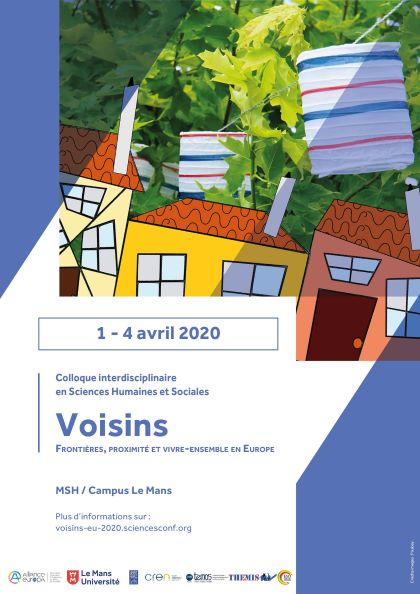Interdisciplinary Conference
in Human and Social Sciences
«Neighbours"

This conference is initiated by different teams in Human and Social Sciences from the University of Le Mans, brought together in this project by a converging theme and calling for inter-disciplinarity: "Neighbours".
Mondialisation - or Globalisation - understood here in its broadest sense, invites us to look beyond the local dimension of the neighbourhood to the proximity it creates on the scale of the entire planet. In this new relational order, borders - as limits separating States, distributing territories and making it possible to distinguish peoples, groups, cultures, languages or even economies - lose their readability and stability: some seem to fade, or even disappear, others move and recreate elsewhere. Citizen identities are diluted to recompose themselves on a larger scale (at the European level for example) or, conversely, and in response to this phenomenon of globalization, on a smaller scale (local political or associative commitments, which affect their daily lives and over which individuals have a direct influence). New technologies are developing, which ubiquity and infinite nature allow the universalization of spaces of communication, exchange or commerce (Internet, social networks, blockchains...). The common living space is always expanding a little more, at the same time as it is tightening due to the emergence of new forms of proximity. Among these, environmental risks, and more particularly climate risks, bring together States and human beings in the same vulnerability, as much as they refer to the individualisms of each, in particular when it comes to establishing the sharing of responsibilities.
The objective of this conference is to explore this theme in its European anchoring and more precisely to address the broad question of the links between borders and governance in Europe around three main research axes:
Axis 1-The border and the narrowing of the world - a holistic view of a common living space
This research axis aims to explore some of the manifestations of this narrowing of the world, with the main cursor being the idea that border dilution and/or displacement multiplies and reinforces (good or bad) neighbourhood situations, on a regional and global scale. It is also a matter of identifying the legal, geographical, social and cultural difficulties involved in establishing these new forms of neighbourhood. Finally, we will look at the forms of expression, particularly artistic and literary forms, that this new type of relational order can take and the questions it raises.
Axis 2: Proximity: Interactions and social development. The issue of neighbourhood, proximity and social interactions
Neighbourhood and proximity induced is a central issue in history studies, particularly medieval studies, closely correlated with that of community and individuality, the subject's autonomy in the face of the identification group. Without limiting (but also without excluding) the historical conception of the community, the proposals could question the postulate that proximity leads to interaction, reinforces horizontal solidarity through the awareness of common interests, but is not only geographical, just as the neighbourhood is not necessarily a source of proximity. This raises the question of remoteness and distance: from when is one close?
Axis 3: Living together: sharing linguistic, cultural, patrimonial and natural resources
Mutations/transformations of societies, socio-economic crises, climate change, migratory flows and international mobility: the beginning of the 21st century is marked by a proliferation of complex and varied situations whose understanding of social, educational and ecological issues challenges "our" ideas and practices of living together and raises the question of new paths and scales of solidarities, cooperation, trade and social/sustainable development.
PROGRAM (UNDER CONSTRUCTION):
The conference will take place on April 2 and 3.
The day of April 1st, will be dedicated to different transversal themes targeted by the team and the scientific committee of the conference.
